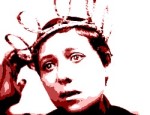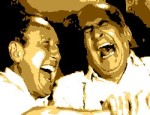Film Review
Jean Rochefort is not only a great actor, he is also something of a
cult figure, a status he owes to some of the weirder films he lent his
talents to.
Few of these films are weirder than the
Breton-bashing sci-fi parody
Ne
jouez pas avec les Martiens, in which Rochefort plays an inept
reporter who finds contact with visitors from a distant galaxy a
somewhat more agreeable prospect than any kind of intercourse with the
inhabitants of a remote Brittany island. More often than not,
sci-fi spoofs tend to fall into the trap of being too silly for their
own good, but this little-known French oddity gets away with its
silliness by playing the humour totally dead pan throughout, the kind
of comedy that suited Rochefort best.
Ne jouez pas avec les Martiens
is based on Michel Labry's novel
Les
Sextuplés de Locmaria and is the only film to be directed
by Henri Lanoë, a renowned film editor whose distinguished list of
credits includes Pierre Étaix's
Yoyo (1965), Jacques Deray's
Flic
Story (1975) and Joseph Losey's
Monsieur
Klein (1976). Lanoë edited many of Philippe de
Broca's films (
Le Magnifique,
Le Cavaleur,
Le
Bossu), so it was presumably by way of recompense that de
Broca helped script Lanoë's sole film as a director.
The sillier interludes in the film have de Broca's unmistakable imprint
stamped all over them and you wonder how much stranger and funnier it
might have been without his
comédie
populaire input.
What is most interesting about the film is how it takes the familiar
sci-fi clichés and uses these to mock not the genre but rather
the habits of the insular, stranger-hating Bretons. The presence
of the silver-cladded, cats' eyed aliens (a look that is eerily similar
to the one adopted by David Bowie in Nicolas Roeg's
The Man Who Fell to Earth (1976))
is almost incidental - much of the humour is directed at the quaint
folk of Brittany. The best gag comes when it is revealed that the
unnamed father of sextuplets turns out to be a passing
extra-terrestrial. "We would have preferred it to have been
someone from these parts" one of the locals solemnly observes,
presumably just before he goes off and sets fire to a Parisian.
The plot is pretty insubstantial and after the shock sudden appearance
of the extra-terrestrials (who, it is worth mentioning, come not from
Mars but from the far superior planet of Gamma-2) nothing much seems to
happen. Of course, the main joke is how the Bretons react to the
robotic-looking aliens - rather than being thrown into a panic (in
typical B-movie fashion), they just seem to treat them as they would
any other party of outsiders, indifference tempered with disdain and
mistrust. Try as they might to blend in, the planet hoppers are
never made to feel welcome, even when they put aside their
disintegrator guns and take to wearing the famous Brittany
coiffe. How weirdly contemporary the film now feels.
Just what the aliens are doing in Brittany is hard to fathom - they
claim to have picked up a message that rogue Martians have landed in the
vicinity but then they admit there is no life on Mars. Apart from
getting blind drunk on the local hooch and putting young Breton women
in the family way there doesn't seem to be much to entice a being from
the other side of the galaxy to this provincial backwater. Maybe
they just like the scenery. Released in France during that
historic month of May 1968,
Ne jouez
pas avec les Martiens, needless to say, came and went without
anyone noticing. But then, as any UFO spotter will tell you,
extra-terrestrials like to be discrete...
© James Travers 2015
The above content is owned by frenchfilms.org and must not be copied.
Film Synopsis
René Mastier, a reporter for a Parisian newspaper, and his
photographer Paddy are too busy enjoying the high life in Rio de
Janeiro to notice a riot breaking out in the streets around them.
Hastily summoned back to Paris by their far from happy employer, they
are given a new assignment: to report on the birth of quintuplets on an
island off the coast of Brittany. Arriving on the island,
René and Paddy are informed by the local doctor, Créache,
that the pregnant girl is not married and the identity of the father is
unknown. As a joke, the nurse Yvonne uses the journalists'
telex to inform the outside world that Martians have landed on the
island. Unfortunately, the report is taken seriously and within
no time the French president is making preparations to welcome the
visiting aliens at the Élysée Palace. No sooner has
René admitted the hoax to his employer than a party of real
extra-terrestrials shows up, demanding to know where the Martians
are...
© James Travers
The above content is owned by frenchfilms.org and must not be copied.



